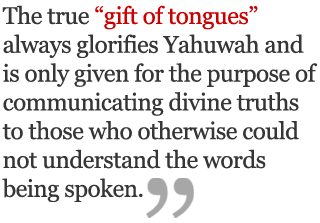
Yahuwah has bestowed rich gifts upon His people on earth. One of the most intriguing, yet least understood Heaven-bestowed gifts is that of speaking in tongues. Many Christians today believe that unless a person has received the “gift of the Holy Spirit” and can “speak in tongues” he or she has not yet been “baptized by the Spirit.” Speaking in tongues is used as a test to prove whether or not a person has been saved. The “speaking in tongues” that is practiced by many Christians today when they say they are praying or worshipping, is contrary to genuine, Biblical speaking in tongues.
Just before Yahushua ascended into Heaven, He told His disciples:
“Go into all the world and preach the gospel to every creature. And these signs will follow those who believe: In My name they will cast out demons; they will speak with new tongues.” (Mark 16:15, 17, NKJV)
 The disciples were given the job of taking the truths of salvation to the entire world! To enable them to do this, Yahushua promised that they would be gifted with the ability to speak in “new tongues” or in other languages. This unique gift was first bestowed on Pentecost and led to the salvation of thousands of precious souls.
The disciples were given the job of taking the truths of salvation to the entire world! To enable them to do this, Yahushua promised that they would be gifted with the ability to speak in “new tongues” or in other languages. This unique gift was first bestowed on Pentecost and led to the salvation of thousands of precious souls.
“When the Day of Pentecost had fully come, they were all with one accord in one place. And suddenly there came a sound from heaven, as of a rushing mighty wind, and . . . they were all filled with the Holy Spirit and began to speak with other tongues, as the Spirit gave them utterance.
“And there were dwelling in Jerusalem Jews, devout men, from every nation under heaven. And when this sound occurred, the multitude came together, and were confused, because everyone heard them speak in his own language.
“Then they were all amazed and marveled, saying to one another, “Look, are not all these who speak Galileans? And how is it that we hear, each in our own language in which we were born? Parthians and Medes and “Elamites, those dwelling in Mesopotamia, Judea and Cappadocia, Pontus and Asia, Phrygia and Pamphylia, Egypt and the parts of Libya adjoining Cyrene, visitors from Rome, both Jews and proselytes, Cretans and Arabs – we hear them speaking in our own tongues the wonderful works of . . . [Yah.]”
"So they were all amazed and perplexed, saying to one another, 'Whatever could this mean?'" (Acts 2:1-12, NKJV)
Peter quickly explained to the crowds what was happening:
“Men of Judea and all who dwell in Jerusalem, let this be known to you, and heed my words . . . this is what was spoken by the prophet Joel: ‘And it shall come to pass in the last days, says . . . [Yahuwah], that I will pour out of My Spirit on all flesh; Your sons and your daughters shall prophesy.’ ” (Acts 2:14, 16, 17, NKJV)
Peter’s sermon was understood by all present, regardless of their native language. The result was beautiful.
“Then those who gladly received his word were baptized; and that day about three thousand souls were added to them. And they continued steadfastly in the apostles’ doctrine and fellowship, in the breaking of bread, and in prayers.” (Acts 2:41, 42, NKJV)
The true “gift of tongues” always glorifies Yahuwah and is only given for the purpose of communicating divine truths to those who otherwise could not understand the words being spoken. By contrast, the sounds uttered by  many who today claim to have the “gift of tongues” is nothing but meaningless babblings. The sounds made are not distinct languages and they certainly do not instruct any in truth and righteousness. In fact, the glossolalia, or “speaking in tongues,” practiced by most people today directly contradicts the guidelines given in Scripture that reveal whether it is genuine or false.
many who today claim to have the “gift of tongues” is nothing but meaningless babblings. The sounds made are not distinct languages and they certainly do not instruct any in truth and righteousness. In fact, the glossolalia, or “speaking in tongues,” practiced by most people today directly contradicts the guidelines given in Scripture that reveal whether it is genuine or false.
Yahushua Himself clearly admonished:
“[W]hen you pray, do not use vain repetitions as the heathen do. For they think that they will be heard for their many words. Therefore do not be like them.” (Matthew 6:7, 8, NKJV)
Paul, more than any other New Testament writer, wrote of the gift of tongues. He warned against the modern meaningless noise that many today call the “gift of tongues.”
“But shun profane and idle babblings, for they will increase to more impiety.” (See 2 Timothy 2:16)
Paul understood that all language is a divine gift given expressly for the purpose of communicating. But if one person does not understand what the other person is saying, communication does not occur! Any language then becomes simply a jumble of meaningless sounds: idle babblings. At one time, the believers in Corinth were in danger of coveting the gift of tongues for the same reason many today desire it – they believed it made them appear more holy and important. Paul quickly set them straight that speaking words which no one understands does not communicate truth and thus does not fulfill the original purpose for why Heaven gives the gift of tongues in the first place!
“But now, brethren, if I come to you speaking with tongues, what shall I profit you unless I speak to you either by revelation, by knowledge, by prophesying, or by teaching?
“Even things without life, whether flute or harp, when they make a sound, unless they make a distinction in the sounds, how will it be known what is piped or played?
“So likewise you, unless you utter by the tongue words easy to understand, how will it be known what is spoken? For you will be speaking into the air.
"Therefore, if I do not know the meaning of the language [being spoken], I shall be a foreigner to him who speaks, and he who speaks will be a foreigner to me." (1 Corinthians 14:6, 7, 9, 11, NKJV)
Paul went so far as to state that if the language being spoken was not understood or could not be interpreted by someone else present who also spoke that language, then the person “speaking in tongues” was to remain silent.
“If anyone speaks in a tongue, . . . let one interpret. But if there is no interpreter, let him keep silent in ekklesia.” (1 Corinthians 14:27-28, NKJV)
 Paul believed in the gift of tongues. He had used it many times! But he understood that the true “gift of tongues” was always a legitimate language that could be understood.
Paul believed in the gift of tongues. He had used it many times! But he understood that the true “gift of tongues” was always a legitimate language that could be understood.
“I thank my . . . [Elohim] I speak with tongues more than you all; yet in the ekklesia I would rather speak five words with my understanding, that I may teach others also, than ten thousand words in a [unknown] tongue.” (1 Corinthians 14:18-19, NKJV)
Paul explained the difference between those who make senseless noise versus those who have actually been gifted with the ability to instruct others of truth in a foreign language:
“He who speaks in a tongue edifies himself, but he who prophesies edifies the ekklesia. I wish you all spoke with tongues, but even more that you prophesied; for he who prophesies is greater than he who speaks with tongues, unless indeed he interprets, that the ekklesia may receive edification.” (1 Corinthians 14:4-5, NKJV)
The “gift of tongues” is just that: a GIFT, given by Heaven, for the express purpose of communicating truth to others. Paul encouraged the Corinthians to “Pursue love, and desire spiritual gifts.” (1 Corinthians 14:1) However, Heaven’s gifts do not come on demand. They are given only to those who, in humbleness of heart, are filled with the Spirit of Yahushua and do His work. Not everyone is given the same gift and no one is given the gifts of the Spirit who uses them to glorify himself.
“There are different kinds of gifts, but the same Spirit distributes them.” (1 Corinthians 12:4, NIV)
The gifts of the Spirit are given to those who have first revealed the fruits of the Spirit.
“But the fruit of the Spirit is love, joy, peace, longsuffering, kindness, goodness, faithfulness, gentleness, self-control.” (Galatians 5:22-23, NKJV)
Yahuwah delights to give the gifts of the Spirit to His children. Yahushua assured all:
“If you then, being evil, know how to give good gifts to your children, how much more will our heavenly Father give the Holy Spirit to those who ask Him!” (Luke 11:13, NKJV)
Heaven is more willing to bestow the gifts of the Spirit than are fallen humans to receive them.
“Every good gift and every perfect gift is from above, and comes down from the Father of lights, with whom there is no variation or shadow of turning.” (James 1:17, NKJV)
All who will humble their hearts, and seek full obedience to the will of Yahuwah, will be blessed with the fruits of the Spirit. Then, when Yahuwah needs them, He will gift His children with the gifts necessary for them to complete His will on earth. Babbling, either in worship or in prayer, serves only to glorify the one claiming to have the “gift of tongues.” It does not edify or instruct in righteousness anyone around if no one can understand what is being said. Such senseless babblings only reveal a lack of the fruits of the Spirit which must necessarily accompany the gifts of the Spirit. Love, patience, and kindness are lost when one glories in his own self-perceived importance by babbling nonsensical sounds. The prayer and worship that is acceptable to Yahuwah is that which comes from a heart full of love, for such a heart is filled with the Spirit of Yahuwah.
“He prayeth well, who loveth well
Both man and bird and beast.
He prayeth best, who loveth best
All things both great and small;
For the dear . . . [Yah] who loveth us
He made and loveth all.”
(Samuel Taylor Coleridge)
Let everyone seek to glorify the Father which is in Heaven, and the Father who sees and knows all will use the humble of heart to glorify His holy name and spread truth and righteousness throughout the earth.